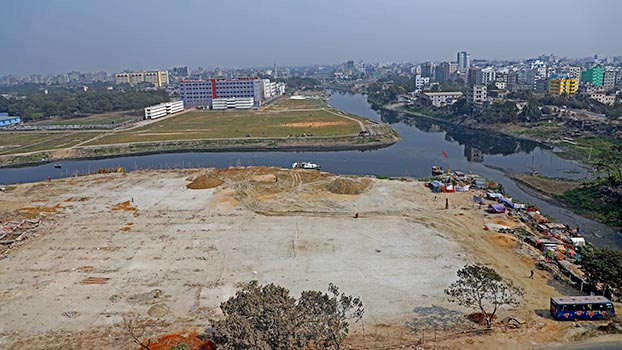Turag River
Mighty turns meager


With the advent of summer, the Turag river, one of the lifelines of capital Dhaka, has turned into a canal, continuously emitting foul odour across the banks, thanks to mindless dumping of wastes and unabated encroachment. Environmentalists said that in addition to decades of carelessness, continuous disposal of city’s garbage and sewage and industrial wastes is pushing the river slowly towards an inevitable death. Adding insult to injury, a section of influential people have grabbed a large portion of the river, shrinking the once mighty Turag into a tiny canal, they said.
Locals claimed that people living on the banks of the river have no alternative to dumping wastages into it due to acute shortage of dustbins in areas adjacent to the river. So, they said, people are throwing garbage unabatedly to the river, creating threat to the environment. During visits to Turag areas, this correspondent found that both banks of the river from Ashulia to Badam, Tongi Bazar Bridge, Raja Bari and Kamarpara have narrowed heavily due to dumping of waste and grabbing.
“The grabbers gradually pile up different types of solid garbage on the bank of the river to establish makeshift shop. Then the grabber establishes his claim on the land,” said a resident of Tongi Bazar area preferring anonymity. He said this trick to occupy riverbank land is followed by all grabbers.
“The grabbers are influential or musclemen. So, we cannot say them anything. Even the administration also fails to evict them finally,” said another resident of the same area on condition of anonymity. Robiul Islam, 45, a shopkeeper of Kamarpara Kitchen market said, “Piles of garbage coming from different kitchen markets on small vans and trucks are being dumped into the Turag river. It has become difficult to live on the riverside as the water is continuously spreading foul odour.”
He also said the administration has recently announced taking comprehensive measures to keep the river free from pollution. “But the grabbers and influential people are dumping garbage daily into the river, defying the announcement.” Abu Naser Khan, Chairman of Save the Environment Movement (also known as Poribesh Bachao Andolon, POBA) told The Bangladesh Post, “All the bad things including encroachment, dumping of waste and other abuses, are occurring under the very nose of the authorities concerned.”
“The government should take strict action against the grabbers. Otherwise, they will continue to encroach on the river,” he added. A week ago, Bangladesh Inland Water Transport Authority (BIWTA) started cleaning the Turag River from to save it. Abdus Samad, Senior Secretary to the Shipping Ministry, inaugurated the cleaning work in presence of officials from the ministry, BIWTA, Gazipur City Corporation, river police and Water Development Board.
Samad said waste was being dumped into the river from Tongi Bazar in broad daylight. He requested the locals and the city corporation not to throw garbage in the river. “It has turned into a dead river as the Gazipur City Corporation did not take any initiative in the last one year to save it,” he added.
A World Bank study said four major rivers near Dhaka -- Buriganga, Shitalakkhya, Turag and Balu -- receive 1.5 million cubic metres of wastewater every day from 7,000 industrial units in surrounding areas and another 0.5 million cubic metres from other sources. The government enacted a law in 1995 making it mandatory for all industrial units to use effluent treatment plants (ETPs) to save river waters from pollution, but owners often flout the statute.



